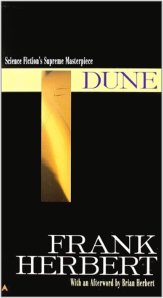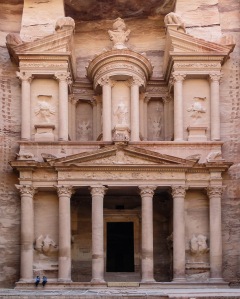Review of Frank Herbert’s Dune
Sorry our long absence and dearth in reviews–Rachel and I have been busy with various and sundry things, grad school and theater productions among them.
I’ve been meaning to read this science fiction masterpiece for quite some time, so after the craziness of the semester and qualifying exams was over, I finally picked up a copy.

One of the most immediately powerful elements of the novel was its highly developed world. Rife with idiosyncrasies and offhand remarks about religious and political elements of this futuristic universe, one immediately gets a sense of the political tension between powerful fiefdoms and the intrigue deep-seated in the highly organized and gendered religious institutions. Just a few pages into the novel, and I felt fully immersed in this technologically advanced but tremendously medieval society divided by diplomatic tension and violent subterfuge.
What made this “realistic” world compelling was the way it provided intricate contexts for suspense, foreshadowing, and thematic development. I often found myself impatient to learn the meaning of certain societal quirks, the outcomes of life-threatening espionage, and the evolution of the main character (Paul) as he grows from a lost, confused adolescent to a religious and political leader. The life and society of the Fremen was perhaps the most intriguing in its development as their worldviews and religious practices are quintessential to Paul’s maturation.
The underlying themes present in the Fremen culture provide a deeper meaning to Dune as Herbert fills it with terminology from fundamental aspects of Islam. Throughout the entire novel, Paul struggles with visions of leading some horrific genocide across human civilization, which he refers to as a jihad–a concept many Muslims associate with an internal, spiritual conflict. The whole of the Fremen is referred to as the ummah, a word in Islam which refers to a global religious community identity that transcends kinship and any other manner of allegiance. There are many other references to concepts from Islam within the Fremen society, making it a rich world full of spirituality and history. Herbert’s drawing from the wealth of Islam (in addition to the feudal elements of the Landsraad and the Empire) provides an enormous degree of depth that would otherwise be inaccessible and moves the world away from the ethnocentrism so often a part of Western literature.
Beyond these well-developed allusions to religion and history, Herbert has a beautiful command of language. With simple language, he develops concise but vivid imagery that constructs a visual architecture for every location in the novel. From the caverns of the Fremen sietches to the Baron Harkonnen’s decadent halls on the planet Geidi Prime, I was always immersed in a stunning visual setting. One great example, from the trek Paul and his mother, Jessica, make across the desert after escaping the Harkonnen army:
The sun dipped lower. Shadows stretched across the salt pan. Lines of wild color spread over the sunset horizon. Color streamed into a toe of darkness testing the sand. Coal-colored shadows spread, and the thick collapse of the night blotted the desert.
One of the most palpable elements of setting, and indeed theme in general, was the absence of water. The majority of the novel takes place on a planet, Arrakis, that is one giant desert where there is no precipitation and there are no oases or bodies of water. From the dryness of the air to the ritual sacredness of crying for the dead to the socioeconomic disparity between the peasants and the nobility (who can afford a garden), water is the exacter, the diviner, the sentencer. It has the first and final say in everything, from economy to ritual to dress. Aside: the efforts of corporate conservation and subsequent selling of water is reminiscent of the water merchants of the ancient city of Petra in the Jordanian desert, yet another indication of the Arabic culture pervading Arrakis.

Economy drives all the major political and institutional decisions throughout the novel. Arrakis is the sole source of fuel for interstellar space travel, its massive worms somehow linked to a substance called the spice melange, giving spaceship pilots the ability to fold space in a sort of tesseract. Even the reclusive Fremen play into the spice market to manipulate the hand of certain political groups.
It is this role of economy that allows Herbert to incorporate a great deal of political commentary, such as his advocating for limited government. At several points, Herbert seems to advocate for a government more like the Ottoman millet system rather than an overarching federal or imperial state controlling the finer details.
Overall, Dune is a rich, compelling read brimming with intrigue and immense depth. Rich with detail and meaning, I felt immersed even after finishing the book. While Herbert offers a great deal of food for thought, Dune is also an enjoyable novel that provides action, suspense, and realistic characters that make for fabulous pleasure reading.
Some quotes that serve as thematic “thread” to tie together different parts of the novel:
“He who can destroy a thing has the real control of it.”
“Fear is the mind killer. Fear is the little death that brings total obliteration.”
“There should be a word for memories that deny themselves.”
Posted on July 22, 2014, in Books, Stuart. Bookmark the permalink. Leave a comment.
Leave a comment
Comments 0